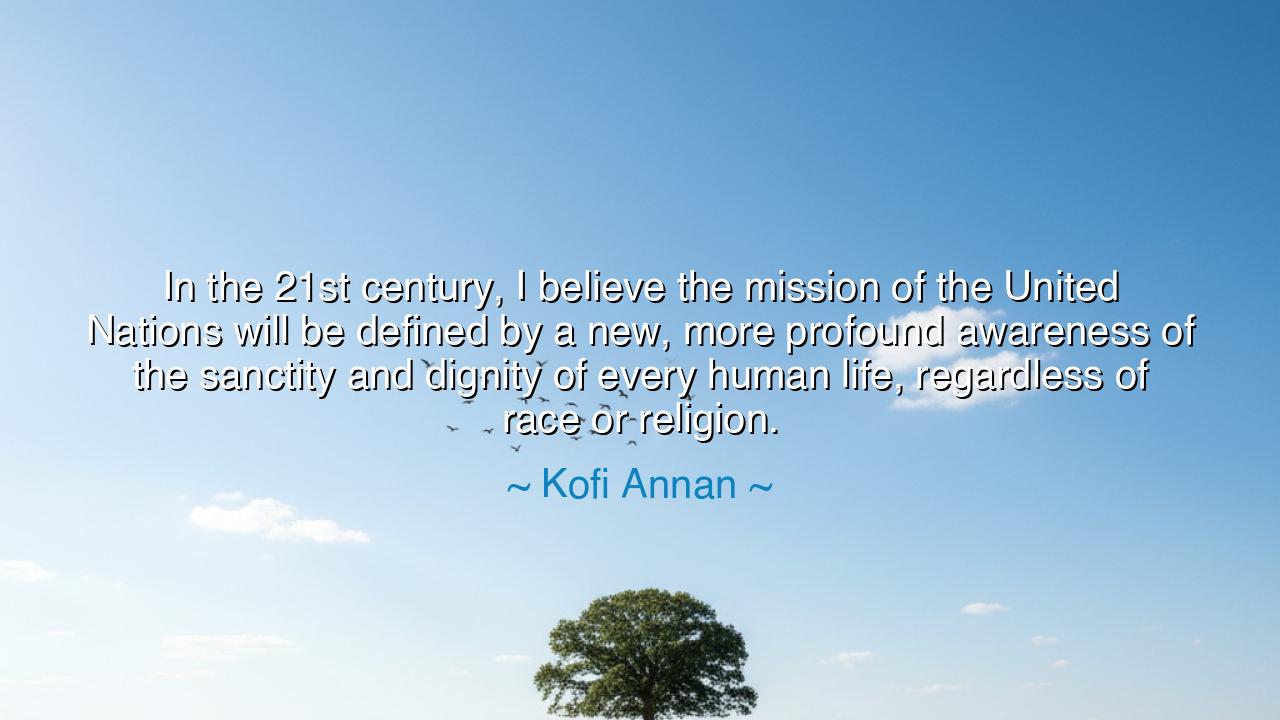
In the 21st century, I believe the mission of the United Nations
In the 21st century, I believe the mission of the United Nations will be defined by a new, more profound awareness of the sanctity and dignity of every human life, regardless of race or religion.






When Kofi Annan, the gentle statesman of Africa and the world, declared, “In the 21st century, I believe the mission of the United Nations will be defined by a new, more profound awareness of the sanctity and dignity of every human life, regardless of race or religion,” he was not merely speaking of politics or policy. He was calling upon humanity to awaken — to rediscover the sacred worth of its own being. His words carry the gravity of centuries, the echo of prophets and philosophers who have all whispered the same truth: that the destiny of civilization depends upon its reverence for human dignity, the recognition that every soul is sacred, and that peace cannot be built upon anything less.
Born in Ghana, Kofi Annan rose from modest beginnings to become the Secretary-General of the United Nations, leading not with thunder, but with light. His leadership was marked by a deep belief that progress cannot be measured by wealth or power, but by compassion and justice. He lived through the dark aftermath of the 20th century — wars, genocides, and divisions wrought by fear and prejudice — and so his vision for the new century was both a plea and a prophecy. The 21st century, he believed, must not be another era of domination, but of awareness — a time when humanity finally sees itself in others, when the barriers of race and religion dissolve before the greater truth of our shared soul.
To understand his words is to understand the scars of history. The United Nations was born from the ashes of world war — an alliance forged in sorrow to protect what had been so easily destroyed: peace, human life, and the idea of equality. Yet the decades that followed tested that promise. Nations fell into new conflicts, and hatred found fresh disguises. Annan’s quote emerged at a turning point, when the world stood on the threshold of a new millennium. It was both a warning and a hope: that unless we recognized the sanctity of life — not in theory, but in practice — humanity would remain trapped in the old cycles of destruction.
Consider the tragedy of Rwanda in 1994 — a horror that Annan carried in his heart for the rest of his days. As the world turned its gaze elsewhere, hundreds of thousands were slaughtered, not for crime or conquest, but for difference. The silence of the international community haunted him. From that silence, he drew his conviction that never again could the global order remain indifferent to suffering. His belief in the dignity of every human being was not a distant ideal; it was born in the sight of unimaginable pain. He came to see that peace is not the absence of war, but the presence of empathy — the courage to act when another’s life is in danger, even if that life is not our own.
In the style of the ancients, we may say this: the sanctity of life is the first law of heaven and the highest duty of man. For all the wisdom of philosophers and power of empires, none have created what even the humblest life embodies — the miracle of consciousness, the breath of spirit, the will to love and to endure. When we forget this, when we divide by color or creed, we become blind to the divine spark within ourselves. To honor life is to honor the eternal. It is the foundation of justice, the root of peace, and the measure of all civilization.
But Annan’s words do not speak only to nations and diplomats — they speak to each of us. For the United Nations is not merely a body of governments; it is a reflection of the human family. Its mission begins in every heart that chooses understanding over hatred, compassion over indifference. When you see another person — stranger, enemy, or friend — as sacred, you carry out that same mission. Each act of respect, each gesture of kindness, each defense of another’s dignity is a stone laid in the temple of peace that Annan envisioned.
So let this be the lesson for all who live in this century: guard the dignity of life wherever it is threatened. Speak against cruelty, no matter how distant; protect the weak, no matter how small; and remember that the worth of your own soul is reflected in how you treat others. Let race and religion be not walls, but windows — through which the light of shared humanity may pass. The world will not find peace through power alone, but through awareness, the sacred knowing that every life is a universe unto itself.
And when the historians of the future look back upon our age, may they say that the words of Kofi Annan were not forgotten — that the people of the 21st century, for all their flaws, at last began to live as one, united not by flag or faith, but by reverence for the divine flame of human life itself.






AAdministratorAdministrator
Welcome, honored guests. Please leave a comment, we will respond soon